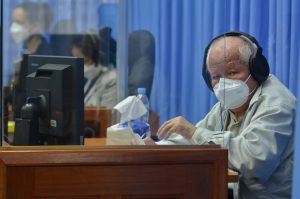The Khmer Rouge tribunal ended 15 years of public hearings today with the former head of state, Khieu Samphan, taking the stand for a dramatic 16 minutes in a last ditch appeal against his conviction for genocide.
Looking fit and dressed in his usual beige jacket, the 90-year-old, who had discarded a face mask worn to guard against COVID-19, said, “I categorically refuse to accept the accusation and the conviction of genocide.”
“I can not accept the accusation that I was involved in a plot to commit crimes against my compatriots including the Cham or the Vietnamese,” he said.
“Many years of sitting as a defendant at the end of this long case it is important for me to inform you and especially inform the Cambodian people that I never wanted to commit a crime against my compatriots or anyone else,” he added.
“No matter what you decide I will die in prison. I will die always remembering the suffering of my Cambodian people. I will die seeing death. I am alone in front of you. I am judged symbolically rather than by my actual deed and as an individual. That’s the end.”
Khieu Samphan’s defense lawyers argued throughout the week that the upper court must overturn the trial chamber’s 2018 verdict. They claimed that the chamber had failed to deliver a written and reasoned verdict on time, which could amount to a “violation” of the tribunal’s own rules.
However, the prosecution dismissed the claims, saying their arguments did not justify overturning his conviction for genocide against the Vietnamese under the Khmer Rouge, who ruled Cambodia with an iron fist between 1975 and early 1979.
Khieu Samphan is the sole surviving leader of the Khmer Rouge, who were responsible for the deaths of up to 2.2 million people through genocide, mass murder, starvation, and torture.
He was put on trial alongside “Brother Number 2” Nuon Chea, the former foreign minister Ieng Sary and his wife Ieng Thirith, and Kaing Guek Eav, commonly known as Duch, the former commandant of the dreaded S-21 torture and extermination camp.
In 2014, Khieu Samphan was convicted of crimes against humanity and sentenced to life. The appeals process in that trial has been exhausted, which means he will remain behind bars even if his conviction for genocide is overturned.
Duch and Nuon Chea both died while serving life sentences for crimes against humanity while Ieng Sary died before his trial was completed. Ieng Thirith was ruled mentally unfit to stand trial. Pol Pot died in 1998.
Neth Pheaktra, spokesman for the Extraordinary Chambers in the Courts of Cambodia (ECCC), as the tribunal is formally known, said a decision on the appeal was not expected until the fourth quarter of next year. In the meantime, the court will finalize its legal work, which dates back to May 2006.
“We still have some administrative work to finalize between the Cambodian government and the United Nations before this court will close and complete its mission,” he said.
That includes the case against Meas Muth, a naval commander blamed for the deaths of 11 Westerners who were seized after their boats strayed into Cambodian waters. They were arrested and sent to S-21 where they perished.
Meas Muth was deemed not to rank among the “senior leaders” or those considered “most responsible,” which the ECCC was tasked with prosecuting for one of the great tragedies of the last century.
Despite this, international prosecutors pursued him, and three others, but they did not win any support from their Cambodian counterparts – needed for a trial to proceed – amid claims of political interference from the Cambodian government to block the prosecution of Pol Pot’s lower ranks.
Prime Minister Hun Sen has previously warned the ECCC, which has cost $330 million to date, would put the country at risk of civil war if it pursued lower ranking cadre.
Luke Hunt can be followed on Patreon and on Twitter @lukeanthonyhunt

































